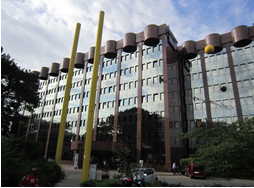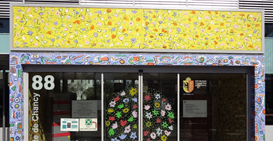Conflict in Ukraine
3. Applying for protection status and the S permit
|
It is important for people from Ukraine to apply for an S permit, as it entitles them to the following benefits and facilities:
|
Step 1: applying for protection
- Persons from Ukraine who wish to apply for protection in Switzerland must go to a Federal centre for asylum seekers (FCA) with procedural tasks, where their application will be processed.
- Persons who already have an address in Switzerland and an identity document must make an appointment directly at RegisterMe for registration in a FCA. They will receive a link to download a train ticket to the FCA. The return ticket will be given ton them when they leave the FCA.
- They must in principle present themselves in person at the FCA. It is not possible to be represented by somebody else.
- If the person concerned is in possession of a biometric passport, it must be brought along. If the applicant does not have a biometric passport, he/she will be asked to prove his/her Ukrainian citizenship by other documents or means.
Federal centre for asylum seekers (FCA)
MZH Sand-Schönbühl
Moosstrasse 28
3322 Urtenen-Schönbühl
- Once the application for protection has been registered, the person concerned will be allocated accommodation in a canton. If the asylum seeker was already living in a private household and is willing and able to stay there, he or she may return to that household and be assigned to the corresponding canton.
Step 2: Persons allocated to the canton of Geneva
- Persons referred to the canton of Geneva must report to the Hospice général:
 |
Centre administratif du Bouchet Accueil Ukraine
Mon-Fri
Open 8h30-16h00 non-stop
|
- They will receive all necessary assistance: accommodation (if they do not already have housing), health insurance, financial assistance, as well as confirmation of the date and time of their appointment to provide the required data for their S permit.
Step 3: Issuing the S permit
- The S permit is issued in a credit card format. It involves taking the following biometric data: photo and signature.
- All concerned persons are invited to present themselves without an appointment at the dedicated counter of the Office cantonal de la population et des migrations (Cantonal Office of Population and Migration).
 |
Office cantonal de la population et des migrations Route de Chancy 88 Reception hours : Monday - Wednesday and Thursday 9h-11h30
|
- Applicants must show up with the following documents: the laissez-passer issued by the FCA; the decision of the Federal migration secretariat (SEM) granting temporary protection status and their passport (or any other document proving their identity).
- The S permit is sent directly by registered mail within 5 to 7 working days to the address of the person concerned.
FAQ on protection status and S permit
Who may benefit from the S protection status?
The S protection status will be granted to :
- Ukrainian citizens seeking protection and their family members (partners, minor children and other close relatives whom they were fully or partially supporting at the time of escape) who resided in Ukraine before 24 February 2022;
- Persons of other nationalities and stateless persons seeking protection and their family members (as listed above) who had national or international protection status in Ukraine before 24 February 2022;
- Persons of other nationalities and stateless persons seeking protection and their family members (as listed above) who can prove via a valid short-term or residence permit that they had a legitimate right to reside in Ukraine and who are unable to return to their country of origin on a safe and sustainable basis.
S status will not be granted to persons who have already obtained protection status in another EU state (Directive 2001/55/EC).
What is the S protection status?
The S protection status provides collective protection to a defined group of persons during the duration of a serious threat.
The S protection status entitles someone to a right to stay as well as a right to have access to accommodation, assistance and medical care. It allows for family reunification and children may attend school.
For more information : The federal state secretariat for migration "S protection status Fact sheet" (currently available only in French, German and Italian):
- Fiche d’information « Statut de protection S »
- Faktenblatt «Schutzstatus S»
- Scheda informativa «status di protezione S»
What is the duration of the protection afforded by the S permit?
The S permit is valid for 1 year. It can be extended for a maximum total of 5 years. If after 5 years the protection status has not been lifted by the federal authorities, a person in need of protection receives a residence permit (permit B).
Is a person with protection status S allowed to work?
A person who has obtained protection status S can work in Switzerland with an authorisation Each new job or change of job is subject to prior authorisation. When applying for a job, the S permit must be submitted to the employer.
-
Ukrainian nationals who were temporarily staying in Switzerland for a trip not subject to authorisation (e.g. tourism) may apply for protection in Switzerland (S permit) in a Federal Asylum Centre (FAC).
-
People who do not wish to apply for protection can apply for a national visa (D visa) to legalise their sojourn.
Is a person with S status allowed to travel?
Ukrainian nationals holding a biometric passport may continue to travel within the Schengen area without a visa for 90 days within a period of 180 days. The S residence permit in itself is not a recognised travel document. Ukrainians holding non-biometric passports and third-country nationals who have obtained an S permit should contact the consulates of the countries they intend to visit before travelling abroad to clarify entry requirements.
Can a person who has obtained the S status in Switzerland reside in France?
No. People who have obtained an S permit in Switzerland cannot reside in France.
Is a person who has been granted S status authorised to relocate to another canton?
Requests to relocate to another canton must be submitted in writing to the State Secretariat for Migration (SEM) in accordance with the information given under the last item in the section "Cantonal allocation".